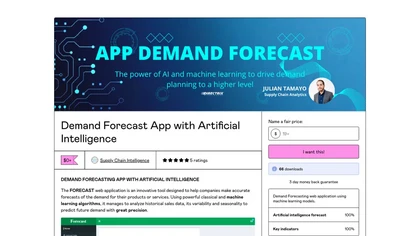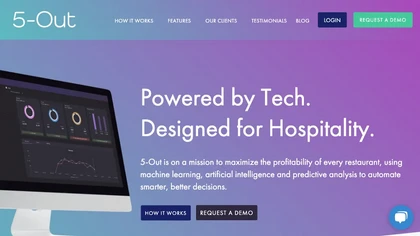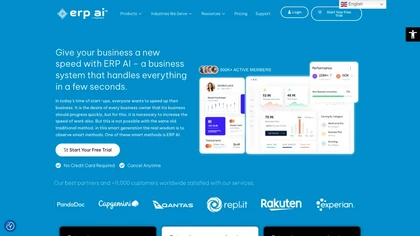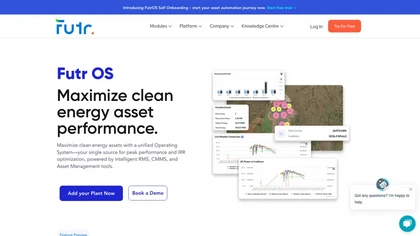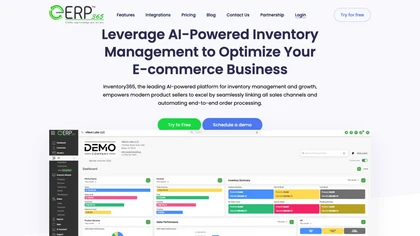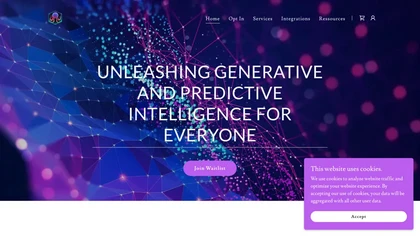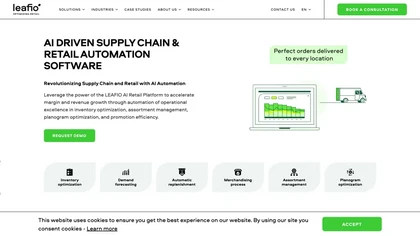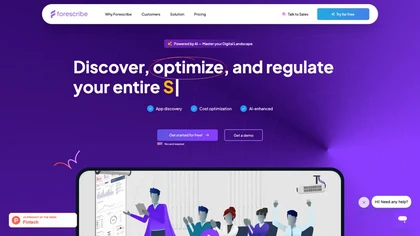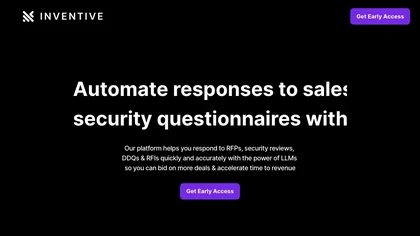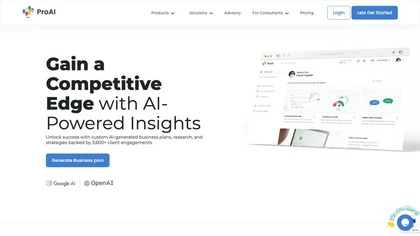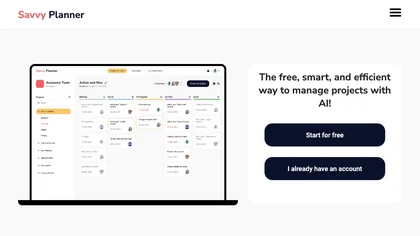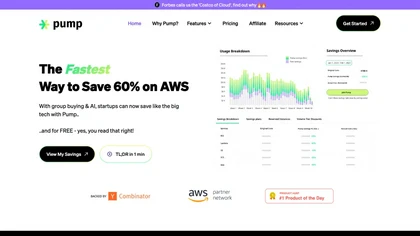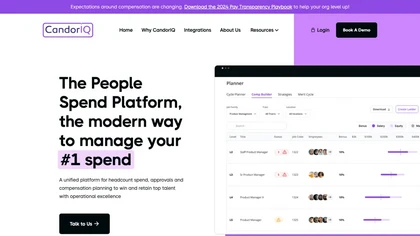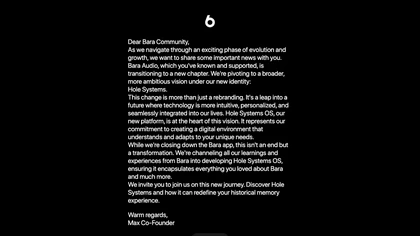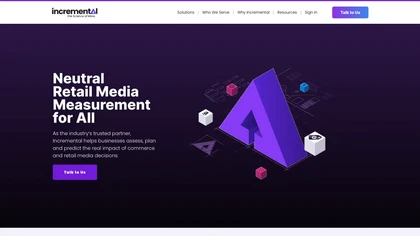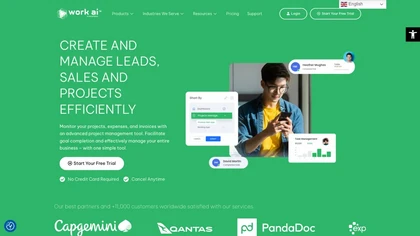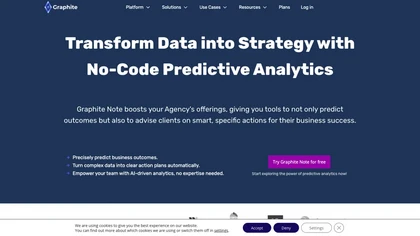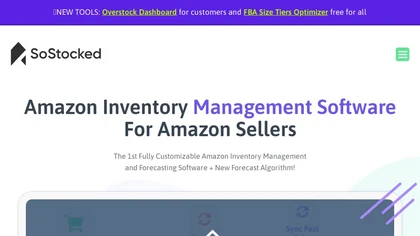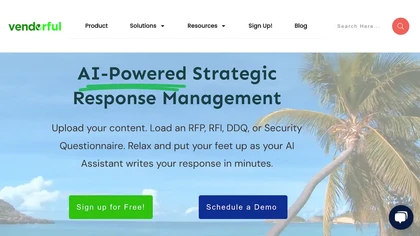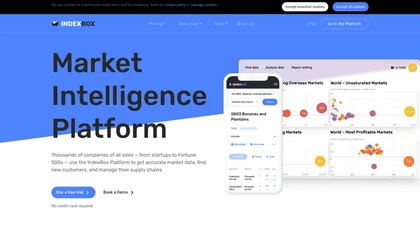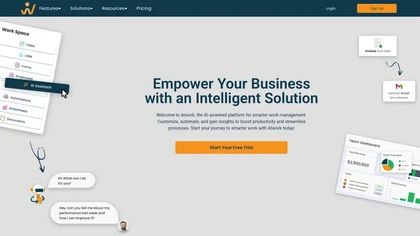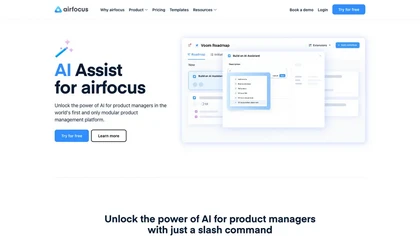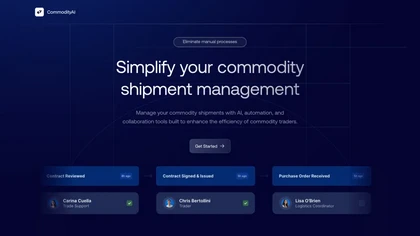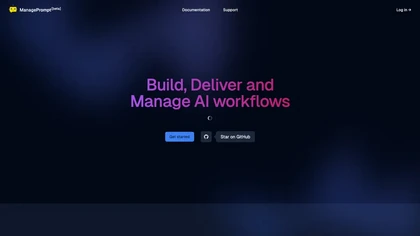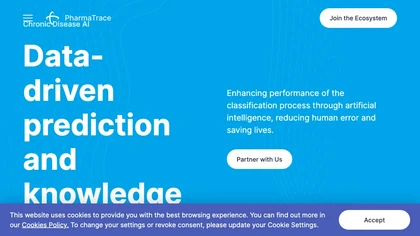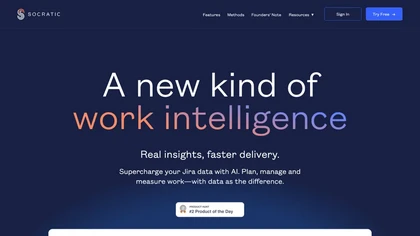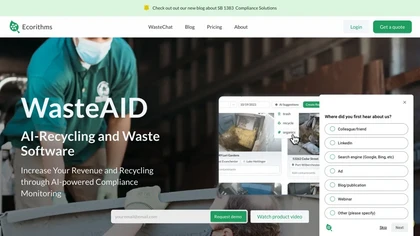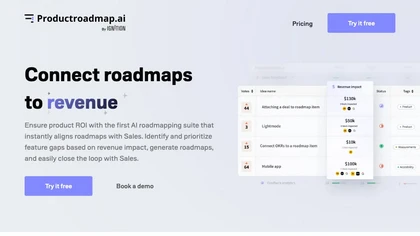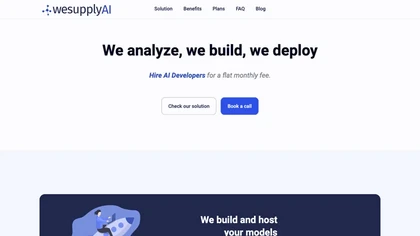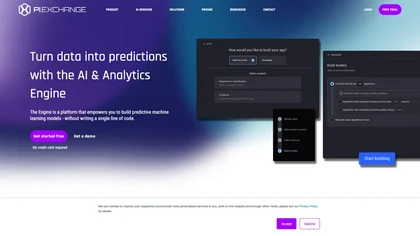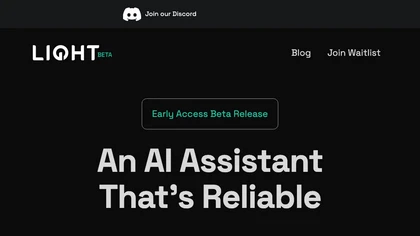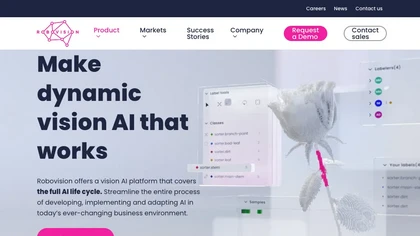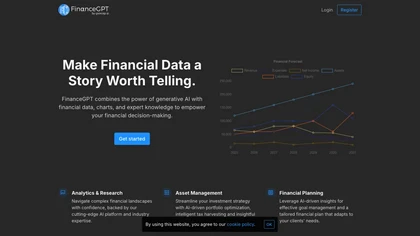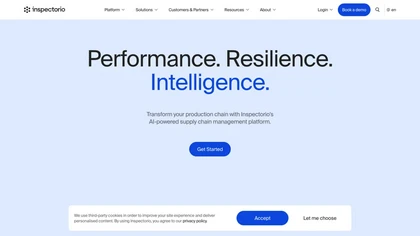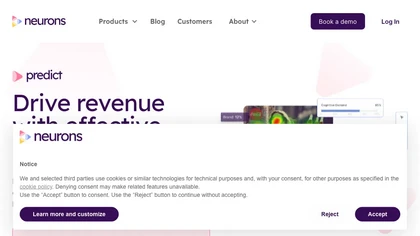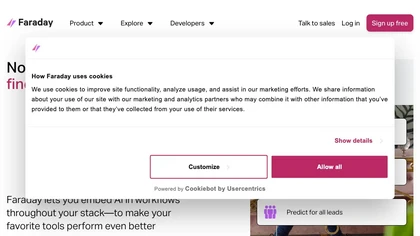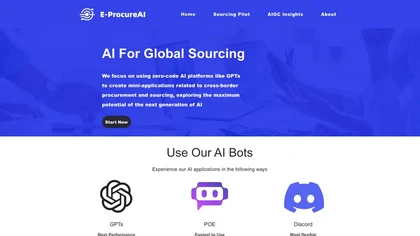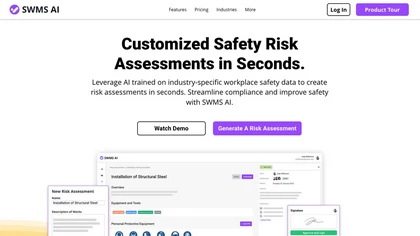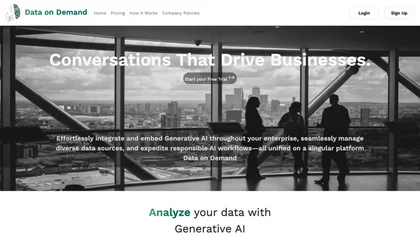AI use cases for Resource Allocation
Generative AI can be applied in various applications for resource allocation. Here are some examples to explore below for inspiration with AI tools to get you started with using AI in resource allocation.
🛠️ 70 AI tools for Resource Allocation
Explore a dynamic list of some of the most popular tools to get you started with various AI use cases and applications for Resource Allocation to streamline your workflows and productivity today.
Demand Forecast features
- Utilizes classical machine learning algorithms
- Allows uploading data sets from Excel
- Automatically selects the best model for each product
- Provides clear visualizations and interactive graphs for demand predictions
- Includes features like historical data analysis, outlier detection, model competition algorithms, and KPI forecast systems
FolioProjects features
- AI project management assistant
- Data-rich dashboards for analysis
- Project portfolio management workflow
- Enterprise asset management life cycle support
- Predictive, prescriptive, and generative AI capabilities
5-Out features
- Predicting sales
- Optimizing labor
- Optimizing purchasing
- Quick setup
- Getting started
MEJ ERP AI features
- Intelligent automation
- Data-driven insights
- Real-time analytics
- Predictive forecasting
- Seamless integration capabilities
FutrOS features
- Unified operating system
- Warranty management
- Digital twin technology
- Automated performance insights
- Real-time alerts
Datatruck features
- Automating manual processes
- Providing reporting analytics
- Offering actionable insights through AI/ML analytics
- Hyper automation capabilities
- Seamless data integration and real-time visibility
Inventory365 features
- Real-Time Inventory Tracking
- Warehouse Management
- Multi-location Fulfillment
- AI-Powered Demand Prediction
- Seamless Integration
🔥
Create your account, save tools & get personal recommendations
Receive a weekly digest of our handpicked top tools.
Unsubscribe anytime
Timely Platform features
- Streamlined workflows
- Enhanced productivity
- Easy-to-use interface
- Real-time reporting
- SMS alerts for reducing no-shows
Predict Expert AI features
- Crafting unique AI models
- Integrating intelligent applications and APIs
- Tailoring AI models and applications to address specific business needs
- Real-time operational insights
- Monitoring performance in real-time
LEAFIO AI Retail features
- AI-driven supply chain and retail automation software
- Automation of inventory optimization, assortment management, planogram optimization, and promotion efficiency
- Features such as demand forecasting, automatic replenishment, and merchandising process optimization
- Caters to various industries including retail, grocery, convenience stores, pharmacies, liquor stores, etc.
- Comprehensive suite of AI-powered tools to streamline retail operations and drive profitable growth
GeniePM features
- Product requirements
- User stories
- Use cases
SageFusion features
- Trend forecasting
- Statistical models and financial statement analysis
- Risk management through portfolio hedging
- Transparent and liquid funds through Interactive Brokers
- Quick fund withdrawal within 48 hours
Forescribe features
- Discover, analyze, and manage integrations of SaaS applications
- Provide real-time insights on SaaS usage and compliance
- Automated compliance checks for SaaS applications
- Offer cost optimization suggestions for SaaS applications
- Enhance transparency in digital landscape governance
Inventive features
- Streamline rfis, rfqs, security reviews, rfps
- Generate reliable answers with ai
- Reduce reliance on subject matter experts
- Save substantial time and effort
- Up-to-date content
CloudVerse.ai features
- Optimized billing
- Asset management
- Cost variances analysis
- Anomaly detection
- Savings recommendations
Futuresearch features
- Comprehensive risk assessments in 15 minutes
- Five-stage AI-powered workflow
- Daily analysis of new scenarios
- Search scenarios based on daily news
- Simulate future outcomes with accurate predictions
retalon.com features
- Predictive analytics
- Demand forecasting
- Merchandise planning
- Smart fulfillment
- Ecommerce operations
ProAI features
- Business strategy generator
- Interactive Guidance and follow up
- Metrics monitoring and insights
- Market research
- Financial forecast
- Pitch deck generator
Reform features
- Modular building blocks for customized solutions
- State-of-the-art multimodal AI models for logistics documentation
- Automation of data capture for various documents
- Seamless integration with universal transportation management systems (TMS) through a universal API
- Embeddable customer dashboards for real-time data insights
Savvy Planner features
- Task Automation
- Data Analysis
- Language Processing
- Project Scheduling
- Deadline Prediction
Pump features
- Automated AWS savings optimization
- AI-powered algorithms for cost-effective AWS strategies
- Maximum security with limited access to user data
- Group buying for collective discounts on AWS
- Invite-based admin control for multiple AWS accounts
idPOD features
- Data integration and analysis
- Integration of multiple data sources
- Advanced algorithms
- Customizable features
- Improving decision-making
CandorIQ features
- Global benchmarking data
- Churn prediction analytics
- Real-time collaboration capabilities
- Integrations with various data sources
- Automated processes like merit letters and candidate offers
Bara Platform features
- Advanced artificial intelligence tool
- In-depth analytics and predictive insights
- Cutting-edge algorithms and machine learning capabilities
- Intuitive dashboard for visualizing complex data sets
- Actionable insights for strategic decision-making
Incremental ai features
- Retail media measurement
- Commerce analytics
- Portfolio management
- Predictive analytics
- Cross-channel commerce analytics
MEJ Work AI features
- Cloud-based system
- Team collaboration
- Task assignment
- Project tracking
- Automatic task prioritization
Product Manager OS features
- AI-powered system
- Task prioritization
- Development management resources
- Customer discovery tools
- A/B testing frameworks
Graphite Note features
- Predict outcomes
- Recommend smart actions
- Analyze customer behavior patterns
- Personalize marketing strategies
- Optimize inventory
SoStocked features
- Amazon inventory management
- Forecasting
- Customizable features
- Data migration
- Personalized onboarding support
Vendorful.ai features
- Vendorful ai-powered response management streamlines responses to rfps, rfis, rfqs, and it security questionnaires with ai assistance.
- It is particularly useful for overworked account executives, rfp teams, and startup founders.
- Currently free while gathering feedback.
- Vendorful assures data security through encryption and organization-level data separation.
IndexBox
5IndexBox features
- Access to accurate market data
- User-friendly interface for quick generation of market reports
- Predictive modeling for forecasting market trends
- Machine learning capabilities
- Data integrity through cross-checking from multiple sources
Scios.ai features
- predictive modeling
- prescriptive analytics
- scenario exploration
- data-backed decisions
- human-centric AI
Atwork features
- Task Management with visual features
- Smart Sheets with customizable tables
- Kanban Board for task visualization
- Import and export data
- Graphical features for data visualization
Manifestly 3.0 features
- Conditional Logic
- Role Based Assignments
- Due Dates & Reminders
- Data Collection
- Customizable Dashboards
AI Assist by airfocus features
- AI-generated ideas and drafts
- Sentiment analysis
- Utilize slash commands
- Prompt features for PRDs and user stories creation
- Feedback sentiment analysis
nOps features
- Automated AWS cost allocation
- Chargebacks and showbacks management
- Resource tagging
- Cost optimization tasks automation
- Rightsizing resources with a single click
CommodityAI features
- Automated shipment processes
- Auto-generated shipping nominations
- Real-time shipment tracking
- AI-driven performance analytics
- Smart data extraction
ManagePrompt features
- Streamlining the process of building and delivering AI workflows
- Instant deployment of workflows
- Prompt tweaking and model updating capabilities
- Security controls for protection against malicious requests
- Utilizing multiple models through APIs from various platforms
PharmaTrace features
- Chronic disease management
- Early disease detection
- Economic costs reduction
- Budget forecasting
- Decision support
Socratic features
- AI-powered platform for planning, managing, and measuring work
- Real-time data analytics and forecasting for decision-making
- Integration with Jira and Git for seamless workflow tracking
- Scenario planning with AI using Monte Carlo simulation
- Customizable views and reports for tracking progress and health
GearChain features
- Real-time AI-powered inventory management
- No-code builder for customizing forms and generating barcode scans
- Blockchain technology for data integrity and transparency
- Role-based access control for security
- AI algorithms for auto-generating forms
WasteAID features
- Automatic route auditing
- Integration with existing systems
- Audit over 400k generators and 1m+ pickups
- Detect overflow incidents and identify contamination
- Tracking commercial account compliance
Productroadmap features
- Automatically connects with crm and support tools
- Prioritizes feature gaps based on revenue potential
- Surfaces key themes, common feature requests
- Streamlines collaboration between product teams
Process features
- AI-powered task generation
- Automated task creation process
- Task generation based on project requirements and deadlines
- Advanced security measures for data privacy
- Workflow simplification
wesupplyAI features
- AI model analysis
- AI model building
- AI model deployment
- Dataset uploading to secure cloud environment
- Integration of personalized APIs
Smartersales features
- Integration with zoom, teams, and meet
- Automated crm data entry
- Instant personalized feedback
- Detailed performance dashboards and summarized email reports
- Customizable experience
Pi Exchange features
- End-to-end machine-learning tool
- Eliminates the need for coding
- Smart data preparation
- Model development
- Deployment functionalities
Servcy features
- Consolidate data from multiple tools into one central location
- Aggregated inbox to view and respond to various communications in one place
- AI support to prioritize and respond to important messages promptly
- AI capabilities for storing and managing documents as well as answering questions
- Features for tracking payments, analyzing time, merging calendars, and providing planning insights
TigerEye features
- Scenario planning
- AI outcome prediction
- Segment definition
- Territory assignment
- Collaborative pipeline management
Trade Foresight features
- Trade insights
- Tools for decision making
- Proprietary trade-technology
- Market access
- Affordable cost
Light features
- Ai task assignment
- Productivity improvement
- Video editing
- Photo editing
- Email reading
- Context understanding
- Calendar management
Dairytech.ai features
- milkround automation
- automatic payment collection
- stock reconciliation
- online order management
- customer communication
Robovision.ai features
- Ai vision intelligence
- Smart machines
- Computer vision systems
- Full automation in horticulture robotics
- User management
FinanceGPT features
- Generative AI technology
- Customizable financial forecasting
- Real-time data aggregation
- Advanced analytics
- Targeted towards investors, financial managers, and accountants
inspectorio.com features
- AI-powered supply chain management platform
- Utilization of innovative technologies like AI
- Digitizes and connects supply chain processes within a single tool
- Enables intelligent analysis of the entire ecosystem
- Reduces production chain risks through advanced analytics
Unfig features
- Automated data capture from various logistics documents
- Universal TMS integrations for seamless connectivity
- Embeddable customer dashboards for real-time data insights
- Scraping information from numerous sources for visibility into logistics data
- Streamlining logistics operations with unprecedented speed and efficiency
Kodus features
- Team performance analysis
- Improvement suggestions for increased productivity
- Automated management tasks
- Weekly reports and metrics
- Automation for enhancing team productivity
Earth.atmo features
- Daily temperature forecast
- Rain forecast
- Wind forecast
- Outdoor activity planning
- Agricultural planning
Prodhub.ai features
- Task automation
- Auto-generation of product requirements
- Proprietary data generative AI
- Collaborative product development
- Export to various tools
Predict features
- Predict human behavior
- Optimize creatives
- Increase conversions
- Improve user engagement
- Unlimited pre-testing and benchmarking
Faraday features
- Predicting customer behavior
- Assessing customer potential
- Providing personalized recommendations
- Identifying at-risk customers
- Optimizing marketing campaigns
Momentum Radar features
- Monitoring social media platforms and influencers
- Predicting market trends and sentiment shifts
- Providing valuable insights and signals for decision-making
- Intuitive indicators for timing and entry point identification
- Focus on momentum indicators and on-chain data analysis
E-Procure AI features
- Zero-code AI platform integration
- Recommendation of supply locations and suppliers
- Market expansion assistance
- Product opportunity identification
- Real-time exchange rate inquiries
AutoPredict features
- Predicting car lifespan
- Analyzing millions of data points
- Generating accurate predictions and statistics
- Offering an api for businesses
- Providing insights and statistics on its blog
SWMS AI features
- Tailored risk assessments generation
- Customizable safety policies
- Personalized document generation
- Integration of AI assistant for safety information
- Streamlining compliance processes
Zuro features
- Generative AI solutions
- LLM technology
- Structured and unstructured data processing
- Predictive model creation
- End-to-end workflow integration
Data on Demand features
- Seamless integration of generative AI throughout enterprises
- Management of diverse data sources
- Expedited responsible AI workflows
- Efficient extraction and analysis of relevant data
- Visualization of complex datasets
Aidaptive features
- Recommendations
- Pricing
- Search
- Merchandising
Contractify features
- Automatic contract tasks and notifications
- Proactive deadline management
- Secure contract repository
- Efficient contract approval flows
- AI capabilities for contract analysis and digitization
